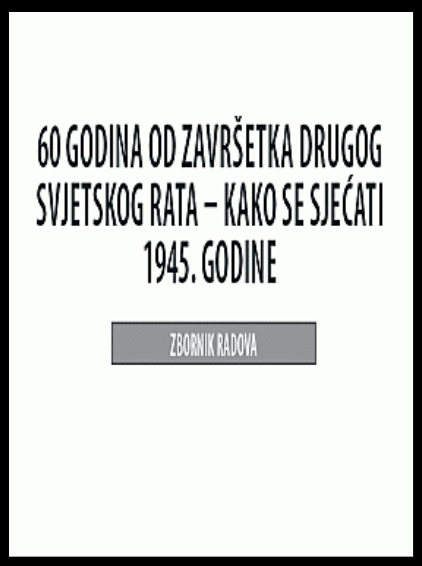Masakri i genocid počinjeni u Drugom svjetskom ratu i ponovno otkrivanje žrtava
Second World War massacres and genocide and the rediscovery of victims
Developments within socialist Yugoslav historiography in an international perspective
Author(s): Tea Sindbaek
Subject(s): History, Political history, Recent History (1900 till today), Special Historiographies:, WW II and following years (1940 - 1949), History of Communism, Historical revisionism, Fascism, Nazism and WW II
Published by: Institut za istoriju
Summary/Abstract: It seems to be a common tendency of the historiography of the Second World War in Yugoslavia and several other countries that certain types of victimisation were left out of history writing for several decades. Particularly experiences of defenceless and humiliated victims were apparently too shameful and painful to be conceived for a long period after the war. From the 1970s and particularly in the 1980s, however, massacres and victims became central in historiography and popular history in Yugoslavia and elsewhere. While this is probably partly the result of a necessary distance in time, it seems also to accompany a change in international discourse, which ascribes moral and symbolic esteem to the role of victims.
Yugoslav historiography naturally had its particular characteristics. There were ideological imperatives, some of which would have been similar to those of other socialist countries, while others were indeed special for Yugoslavia: The need to emphasise an autochthonous revolution independent of the Soviet Union, a history of brutal violence and strong antagonisms between different groups within Yugoslavia, the changing political climates, not least following Tito’s death. Nevertheless the similarities in the developments of Second World War historiography in Yugoslavia and elsewhere are striking. Therefore I believe that Yugoslav historiography has participated in and been influenced by these common tendencies.
In the Yugoslav case the heroic deeds of the partisans remained the positive focus of World War II history into the 1970s. When finally genocide and victims’ suffering entered the historians’ agenda in the 1980s, however, these issues formed a particularly powerful theme within history and public debate. This was partly because re-evaluation of this historic period also meant rethinking of the background of the political system, and partly because reviving these gruesome historic experiences would inevitably influence national relations among the Yugoslav peoples.
Book: 60 godina od završetka Drugog svjetskog rata: kako se sjećati 1945. godine
- Page Range: 63-74
- Page Count: 12
- Publication Year: 2006
- Language: Bosnian
- Content File-PDF

